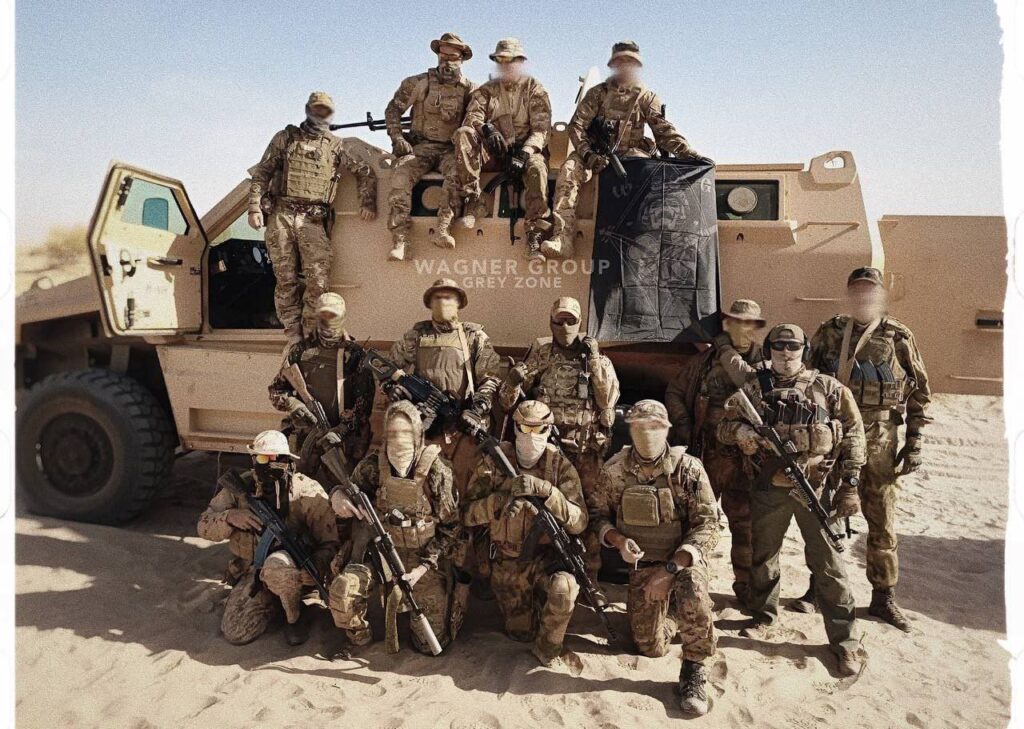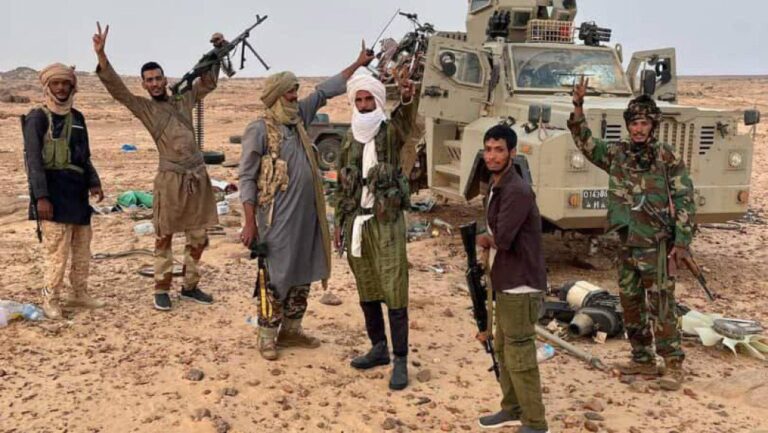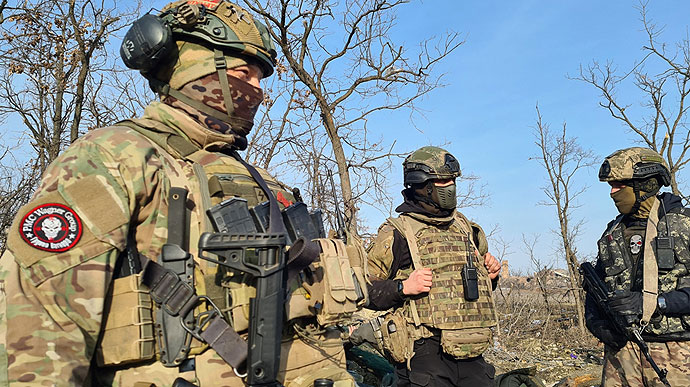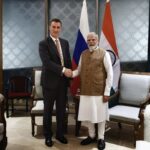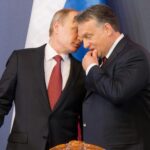The Central African Republic (CAR) faces mounting pressure from Moscow to phase out the Wagner mercenary group in favor of a new Kremlin-controlled “Africa Corps.” Russian officials – including a deputy defense minister – have urged CAR’s government to replace Wagner with this state-run unit and start paying cash for security services. CAR’s leadership has so far resisted, arguing that Wagner forces are more effective and deeply integrated with local units, and noting that Bangui prefers compensating with mineral concessions rather than cash payments.
- Since 2018, Wagner mercenaries have become embedded in CAR’s security and economy. They protect President Faustin-Archange Touadéra, train the national army, and fight rebel insurgencies, effectively acting as an elite guard for the regime. In return, Wagner has received lucrative perks – access to gold and diamond mines, timber exports, and other mineral riches. This “guns-for-resources” model has bound Russia’s private fighters to CAR’s ruling circle and made Wagner an indispensable pillar of the country’s stability (despite allegations of human rights abuses).
- Moscow’s Motives for Change: Following Wagner chief Yevgeny Prigozhin’s 2023 death and the group’s aborted mutiny, the Kremlin is determined to rein in mercenary autonomy and assert direct control over its Africa operations. By installing the Africa Corps – a unit under Russia’s Ministry of Defense – Moscow aims to centralize command, formalize its presence, and capture profits that previously flowed to Wagner’s private coffers. Russia also seeks hard currency payments to fund its war effort and mitigate sanctions, rather than relying solely on barter deals. In short, the Kremlin wants a tighter leash on overseas deployments and a bigger share of the spoils.
- Bangui’s Reluctance: CAR’s government is hesitant to cut ties with Wagner. Officials praise Wagner’s combat performance and local knowledge (“they understand the terrain…and deliver results,” one official noted). By contrast, the new Africa Corps is seen as untested and focused on training rather than frontline fighting. Moreover, Russia’s demand that Bangui foot a multimillion-dollar bill (in the billions of CFA francs) for Africa Corps personnel alarms a cash-strapped government. CAR would rather continue paying with gold, uranium, and other resources – a model that doesn’t drain its treasury. Politically, President Touadéra’s inner circle trusts Wagner’s men, who have “connections with [CAR] officers” and a fearsome reputation on the ground. There is concern that swapping in a formal Russian unit could upset the delicate balance that keeps the regime in power.
- Regional Parallels: The tussle in CAR is part of a broader shift across Africa. Mali’s junta has already accepted the Africa Corps in place of Wagner, a transition reportedly imposed by Moscow earlier in 2025. In Burkina Faso, which invited Russian help after its 2022 coup, Africa Corps “instructors” arrived in late 2023, marking an expansion of Russian influence under official auspices. Sudan presents a different case amid its ongoing civil war: Wagner networks were entrenched in Sudan’s gold trade and backed the Rapid Support Forces, but Russia now pursues a formal deal with Sudan’s army (offering arms for a Red Sea naval base) to secure its interests. These cases illustrate Russia’s post-Wagner playbook: replace or absorb mercenary operations into a state-directed “Africa Corps,” extending Russian military-commercial reach but under closer Kremlin supervision.
- Kremlin’s Evolving Strategy: The move from Wagner to Africa Corps signals a new phase in Russia’s Africa policy. No longer content with deniable proxies, Moscow is institutionalizing its intervention model – deploying personnel tied directly to the Ministry of Defense and pairing them with state-owned companies to hunt for mining, oil, and port deals. This strategy is geopolitically driven: with the war in Ukraine ongoing, Russia is shoring up allies and assets in Africa to bypass Western sanctions, win UN votes, secure raw materials, and even recruit fighters. The Africa Corps approach is also low-cost and low-risk from Russia’s perspective, relying on relatively small deployments and influence operations (propaganda, military training) to yield outsized strategic dividends. However, by taking direct control, the Kremlin also assumes full ownership of these ventures – blurring the line between “private” mercenaries and Russian state power. This increases Russia’s stake (and responsibility) in Africa’s security affairs.
- Outlook for CAR – Scenarios: Moving forward, CAR faces difficult choices. If Touadéra accedes to Moscow’s demands and brings in the Africa Corps, his government may secure continued Russian protection but at the cost of greater financial outlays and potentially less capable on-the-ground support (at least initially). Should Bangui push back or stall, it runs the risk of angering the Kremlin and being left isolated – a grave threat given that CAR’s army cannot hold off rebel factions alone. A compromise is possible (for example, allowing a gradual transition or paying Russia via increased resource concessions), but time is not on CAR’s side. Russia “forced Mali to accept the change,” and CAR realistically has “no options since they chased away the Europeans”. Western powers, notably France and the EU, will be watching closely: a CAR that openly resists Moscow might invite tentative Western re-engagement, whereas full alignment with a Russian state-run force would cement CAR in Moscow’s camp, likely precluding any near-term Western return.
- Implications for African Sovereignty and Global Players: The CAR episode underscores a larger tension: African states embracing foreign security patrons to prop up regimes, at the risk of sovereignty. Russia’s new model – formal agreements, bases, and direct command – could further erode host nations’ autonomy, effectively embedding Russian forces indefinitely under the banner of “training missions” or bilateral pacts. For the West (France, EU, and the U.S.), Russia’s Africa Corps expansion is a wake-up call that Moscow is consolidating a strategic footprint in Francophone Africa, filling the vacuum left by retreating Western forces. In the short term, CAR’s refusal to pay cash highlights the limits of Russia’s leverage – the Kremlin may need to accept minerals in lieu of money or risk destabilizing an ally. In the longer term, however, Russia’s willingness to deploy official forces and invest in client regimes (even modestly) indicates a durable commitment to remain a kingmaker in African conflict zones. CAR’s fate will be an important bellwether: it will reveal whether Moscow can successfully tighten control over its expeditionary ventures without undermining the local effectiveness that made Wagner useful in the first place, and whether African leaders can assert any agency when their primary security guarantor starts changing the terms of the deal.
Russia’s role in the Central African Republic has entered a pivotal new phase. In recent months, senior CAR officials leaked that Moscow is pressuring Bangui to replace the infamous Wagner Group mercenaries with a Kremlin-backed “Africa Corps,” a new state-run paramilitary force. Along with this change, Russia has demanded that CAR begin paying for security services in cash – a stark departure from the current arrangement in which Wagner is compensated through mining rights and resource barter. CAR’s government, however, has been reluctant to acquiesce, expressing confidence in Wagner’s capabilities and insisting it cannot afford big cash outlays.
These developments come in the aftermath of Yevgeny Prigozhin’s death in 2023, which threw Wagner’s future into uncertainty, and amid Russia’s broader effort to streamline its overseas interventions during the protracted war in Ukraine. What happens in CAR will reverberate beyond its borders. The model being tested – swapping an unofficial mercenary outfit for a formal Russian military “contractor” corps – is already playing out in Mali, and is on the table in places like Sudan and Burkina Faso. For policymakers, CAR’s case offers insight into the Kremlin’s evolving strategy of power projection in Africa, the potential vulnerabilities of client states, and the implications for Western influence in a region where Russia has gained ground.
The Wagner Group’s presence in CAR dates back to 2018, when President Touadéra, struggling to contain a civil war, invited Russian assistance. Since then, Wagner “have been providing security to the president and government officials” and training the national army. These Russian paramilitaries effectively act as elite Praetorian guards and field commanders embedded with CAR’s forces. They played a decisive role in early 2021, for example, when a coalition of rebels nearly marched on Bangui; Wagner fighters helped push back the insurgents and prevent the capital’s fall. They also secured the December 2020 elections and a 2023 constitutional referendum that abolished term limits, thereby tightening Touadéra’s grip on power. In day-to-day terms, Wagner operatives run training camps, advise on military operations, accompany CAR troops in the field, and have even been accused of spearheading counterinsurgency sweeps with little regard for civilian casualties. Though nominally “instructors,” they are combat forces by any reasonable definition – engaging directly in firefights alongside government soldiers.
Economic Functions: In exchange for this support, Wagner and its affiliated companies have secured extensive economic concessions in CAR. The arrangement has essentially been a barter system – “security for resources.”CAR’s government has granted Wagner-linked firms control over lucrative gold and diamond mines, timber harvesting rights, and other natural resource contracts. One flagship asset is the Ndassima gold mine, a site so valuable that Wagner guards keep local villagers far away from its operations. Estimates vary, but investigative reports suggest Russia (via Wagner) has been extracting hundreds of millions of dollars per yearfrom CAR’s natural wealth. An NBC News investigation in 2022 found that the Kremlin’s agents were siphoning off about “half a billion dollars a year in gold, timber, and blood diamonds” from CAR. These profits not only enrich Wagner’s network but also further Moscow’s strategic interests – providing off-the-books funding that can bankroll Wagner deployments or even support Russia’s wider foreign ventures. In effect, Wagner built a state-within-a-state in CAR’s economy, taking over formerly French-controlled diamond fields and establishing its own logging and mining subsidiaries. This economic footprint gives Wagner enormous influence: it employs locals, pays (some) taxes, and has become a stakeholder in CAR’s otherwise fragile economy. It also means Touadéra’s administration is financially intertwined with Wagner, relying on the mercenaries to both stabilize the country and exploit its resources. This symbiosis was calling Wagner’s approach a “blueprint for state capture” – pairing military might with commercial exploitation to prop up a friendly regime.
Political Influence and Local Integration: Beyond the battlefield and the mines, Wagner has woven itself into CAR’s political and social fabric. Russian operatives have served as presidential advisers and trainers for the presidential guard, and Wagner-financed “instructors” often accompany CAR officials on tours in the provinces. Wagner has also run propaganda campaigns – through local language radio and social media – to boost Russia’s image and denigrate Western partners. These efforts have spurred pro-Russian, anti-French sentiment among segments of the population, giving the Touadéra government a convenient narrative that aligns with its pivot away from France. On the security front, Wagner’s members forged close ties with CAR’s officer corps through years of joint operations. This camaraderie (and occasionally shared profits from illicit trading) breeds a level of trust that a new unit parachuted in from Moscow might lack. A CAR military official emphasized that Wagner “has connections with the officers [and] are feared operationally” by CAR’s enemies. In other words, Wagner’s reputation alone – brutal as it may be – confers psychological dominance on the battlefield.
In summary, by late 2023 Wagner was deeply entrenched in CAR: an essential security guarantor for the regime, a major economic actor, and an influential political ally. Any abrupt change to this status quo, such as Moscow’s attempt to install a new Africa Corps, would thus be seismic for Bangui. Wagner’s dual role – shielding the state while plundering it –means that replacing Wagner is not as simple as swapping one security contractor for another; it entails reorganizing the politico-economic order Russia helped create in CAR.
Wagner delivered reliable results in CAR and other African states, extending Russian influence at a bargain price. Several factors are driving Russia’s push to replace Wagner with a state-managed Africa Corps:
1. Asserting Control After Prigozhin’s Rebellion: The June 2023 Wagner mutiny in Russia – even though it was short-lived – rang alarm bells in the Kremlin. Yevgeny Prigozhin’s private army had grown too powerful and independent, highlighting the risks of outsourcing key military operations to a mercurial warlord. After Putin reportedly agreed to dismantle Wagner’s presence in European Russia, attention turned to Wagner’s far-flung enterprises. Prigozhin’s death in August 2023 then removed Wagner’s top leadership. Seizing this moment, the Russian state moved to “dissolve the group’s African operations” and re-subordinate them under the Defense Ministry’s authority The formation of the Africa Corps – announced in late July 2023, just days after Prigozhin’s failed mutiny – was a direct response. By creating a new unit “tethered closely to the military chain of command,” Moscow could integrate Wagner personnel without leaving them under a rogue oligarch’s influence. Deputy Defense Minister Yunus-Bek Yevkurov and General Andrei Averyanov (of military intelligence) were put in charge of standing up the Africa Corps, signaling how seriously the Kremlin took this restructuring. In short, **Moscow’s motivation is to eliminate Wagner’s autonomy and prevent any future ‘private’ army from wielding such leverage over Russian foreign policy. By placing African operations under formal Ministry of Defense oversight, the Kremlin regains a clear hierarchy of command. The Africa Corps recruits – many of them ex-Wagner fighters – now sign contracts with the Russian state, swear allegiance to its military leadership, and can be disciplined or redirected as needed. This reduces the risk of another Prigozhin-like figure emerging from the shadows.
2. Centralizing Military-Commercial Operations: Wagner’s model was profitable, but from Moscow’s viewpoint, it had a glaring flaw: much of the profit stayed with Prigozhin’s network rather than flowing into state coffers. Gold bars from CAR, for instance, would be flown to Prigozhin-linked companies in Russia or the Middle East, not necessarily to Russia’s central bank. By transitioning to the Africa Corps, the Kremlin intends to “formalise its control over operations” in Africa and ensure the spoils are accounted for. The Africa Corps, unlike Wagner, is “directly controlled by the Russian Ministry of Defence” and operates through official bilateral channels. This allows Moscow to negotiate state-to-state agreements – for example, defense cooperation treaties or base leases – which can lock in long-term rights to minerals or strategic infrastructure in return for Russian protection. The Kremlin also gains transparency (internally) into what its operatives are doing on the ground. These activities serve a more coordinated Russian state strategy rather than an entrepreneur’s agenda. The move can be seen as Putin “putting things back in order” after the Wagner Group’s dismantling. By early 2024 Yevkurov was busy negotiating new arrangements and even bases (such as a proposed Russian base in CAR) to formalize Russia’s military presence under the state flag.
3. Demand for Cash and War Financing: A striking element of Russia’s demand to CAR is the insistence on monetary payment for security services going forward. This likely reflects Russia’s acute financial needs as the war in Ukraine grinds on. Unlike Wagner’s expeditionary ventures (which were quasi self-financed through resource smuggling), the Africa Corps expects host countries to cover salaries and costs, and even pay a premium to Moscow. Russia was asking Bangui to pay “billions of CFA francs” – on the It push for cash now because sanctions and wartime expenditures have made foreign currency more precious for the Kremlin. If African partners can be persuaded to pay in dollars, euros, or other stable currencies, that directly aids Russia’s economy (or war chest). Additionally, formal defense contracts could open the door for Russia to sell arms or services on credit, tying the client into debt obligations. There is also a symbolic aspect: asking for payment reinforces that Africa Corps is a state-run military mission.
4. Strategic and Geopolitical Objectives: Broader strategic calculus also underpins Russia’s move. Since invading Ukraine, Russia has placed greater emphasis on Africa as a friendly geopolitical arena. African countries supply votes at the UN and access to critical resources (like minerals needed for technology and defense). With relations to the West severed or strained, Russia is doubling down on “Global South” partners. The Africa Corps fits into this by serving as a tool of Russian statecraft on the continent Africa Corps deployments are guided by a deliberate strategy: “low investment, low risk, directed by the Russian government, and embedded in broader political efforts,” accompanied by state corporations chasing business deals. The Kremlin’s aims include obtaining port access in strategic locations, securing mining and energy concessions, and ensuring that allied regimes remain in power and aligned with Moscow. For instance, the Russian military has shown interest in Gulf of Guinea portsfor naval access and logistics. In pursuit of these goals, having a more disciplined and state-directed force is advantageous. It allows Russia to present itself not as sponsoring a rogue militia, but as a reliable security partner that can sign formal agreements. We see this in Equatorial Guinea, where Africa Corps “instructors” arrived in 2024 to protect the president and train forces, paving the way for port and energy deals. In summary, Moscow wants to leverage its military footprint in Africa for long-term strategic gain – building influence that outlasts any single mercenary company. By transitioning to Africa Corps, Russia can more credibly commit to these partners (since the mission will not collapse with one man’s demise) and integrate African operations into its global military planning.
5. Reducing International Liability while Maintaining Influence: Wagner’s notoriety had become a double-edged sword. On one hand, its very name struck fear locally; on the other, it attracted Western sanctions and condemnation that tainted the African governments working with it. By rebranding Wagner’s activities under the Russia state, Putin may be calculating that it dilutes the “outlaw mercenary” image. (It is telling that Russian officials now emphasize the term “instructors” or “Advisers” from the Ministry of Defense, distancing from the Wagner brand.) That said, this is a gamble – as we will discuss, a state-run Africa Corps also means the Kremlin must take full ownership (there’s far less plausible deniability if atrocities occur). Moscow probably intends to tighten its grip on its paramilitary operations in West and Central Africa, with the aim of entrenching its presence and consolidating access to resources there.” Everything about the Wagner-to-Africa Corps shift points to a Kremlin that wants more direct control and a larger strategic return on its investment in Africa.
In sum, Russia’s push to replace Wagner in CAR is driven by both reactive reasons (reasserting control after Wagner’s insubordination) and proactive strategy (maximizing and formalizing Russia’s influence in Africa under the state’s banner). The Africa Corps is essentially Wagner 2.0, but under new management – the Kremlin’s management. Understanding this helps explain why Moscow is pressuring allies like CAR: from the Russian standpoint, it is a necessary upgrade to ensure that its expeditionary ventures align tightly with national interests and do not become fiefdoms of a private warlord.
From the perspective of CAR’s leadership, Russia’s proposal to swap out Wagner for the Africa Corps raises red flags. Bangui’s reluctance is rooted in pragmatic concerns about security effectiveness, financial considerations, and political trust. Below, we unpack the key reasons:
1. Wagner’s Proven Performance vs. an Unproven Replacement: CAR officials consistently underline that Wagner mercenaries have been highly effective in stabilizing the regime. T CAR’s leadership worries that Africa Corps units will focus on training and advisory roles rather than do the hard fighting. unlike Wagner, which fights rebels alongside government forces, Africa Corps is more focused on training” – a shift that “could be contentious” because CAR’s army still needs frontline help. CAR’s military is weak; training alone will not immediately make them battle-ready. Officials fear a scenario where Russian instructors hold back from direct combat, leading to rebel advances. They also point out that the Africa Corps lacks Wagner’s “combat credibility.” Wagner has a formidable (if brutal) reputation after fights in Syria, Libya, Mali, and CAR itself. It “are feared operationally” by insurgents and even rogue army units. Will a new contingent of Russian officers and soldiers, who have not personally earned that fear in CAR, be as effective a deterrent? Bangui is doubtful.
CAR’s leadership worries that introducing Africa Corps officers – who will answer directly to Moscow – could disrupt these working relationships. Touadéra’s inner circle likely has personal stakes with Wagner’s top operatives. There are reports that senior CAR officials benefit from Wagner’s commercial deals – whether through unofficial revenue cuts or by using Wagner to eliminate political rivals. This means Wagner has become entwined with the patronage networks that keep Touadéra in power. Replacing Wagner risks unraveling these networks. CAR’s ruling elites may not be confident that unknown Russian officers will maintain the same “arrangements” or loyalty.
3. Financial and Transactional Preferences: Perhaps the biggest sticking point is how CAR can pay for its security. Wagner’s model – taking a share of natural resources – was, from the government’s view, budget-friendly. CAR did not have to write big checks; instead, it granted mining licenses and let Wagner extract and export minerals. While this came at a long-term economic cost, it was politically easier than allocating millions in cash from the treasury (which is heavily aided by donors and constantly under pressure). Now, Russia is essentially presenting a bill: cover the salaries and expenses of the Africa Corps, and pay additional fees to Moscow, amounting to “millions of dollars”. CAR’s annual government budget is only on the order of a few hundred million dollars; it simply does not have spare millions in hard currency. Authorities in Bangui said they are unable to pay the amount” Moscow wants. The official added that CAR hopes to keep paying “with strategic and mineral resources, notably gold, uranium, and iron” instead. This mismatch in preferred payment method is a core dispute. From Bangui’s perspective, giving up some mining rights is tolerable (especially if those areas were rebel-controlled or not producing before). But paying in cash could mean diverting funds from civil servant salaries or social services, which could create internal discontent or require going to international lenders with cap in hand. CAR’s reluctance, therefore, is partly about avoiding financial collapse or austerity that might result if they must fund a foreign force directly. Moreover, paying cash for foreign troops has a national sovereignty optic: it could look like CAR is “hiring an army” or, worse, paying tribute. The current arrangement, by contrast, is framed as win-win cooperation. In sum, Bangui prefers the barter-like system that has prevailed – it keeps security “off-budget.”
The Central African Republic is not alone in facing a Wagner-to-Africa Corps handover. Russia is executing a similar playbook in several African states – with varying degrees of acceptance and resistance. Examining these cases in Mali, Sudan, and Burkina Faso provides context for CAR’s situation and highlights patterns in Moscow’s approach.
Mali’s military junta, which took power in 2020 and cemented control with a second coup in 2021, turned to Wagner in late 2021 after falling out with France. Around 1,000 Wagner personnel deployed to Mali, ostensibly to fight jihadist insurgents in exchange for hefty fees and mining rights (Mali is Africa’s third-largest gold producer). Wagner’s presence was formally denied by Bamako but widely documented.
Transition to Africa Corps: After Prigozhin’s mutiny and death, Mali became the first known case of Russia replacing Wagner with the Africa Corps. By early 2025, this transition was largely complete. Mali has already accepted the Africa Corps” and Wagner forces there were “replaced earlier this year in Mali”. Deputy Minister Yevkurov personally visited Mali to smooth the process – a visit in spring 2025 accelerated the swap, culminating in Wagner announcing its “mission complete” and departure in June 2025. Notably, this came after a disastrous Wagner-led operation in Mali’s north (the Battle of Tinzaouaten in 2024), where Wagner fighters suffered an ambush by rebels. That failure may have given Mali’s junta incentive to accept a revamped Russian approach. In any case, Moscow essentially imposed the change, and Mali’s leaders – heavily reliant on Russian weapon deliveries and training – acquiesced. An analyst noted, “In Mali, they forced them to accept the change”. The Africa Corps in Mali reportedly took over Wagner’s bases and even operates from an expanded headquarters near Bamako’s airport. It continues to train Malian troops and assist in operations, though reports suggest its footprint remains similar in size and method to Wagner’s. The key difference is formalization: Mali’s government has openly signed defense agreements with Russia and engages directly with the Kremlin’s envoys. In late June 2025, Interim President Assimi Goïta traveled to Russia, meeting President Putin and Russia’s defense minister, a visit that underscored Mali’s endorsement of the new arrangement. Moscow holds tighter strings on the deployment. One risk is that if Africa Corps is less aggressive than Wagner was (perhaps restraining from some combat), Mali’s counterinsurgency struggle might stagnate. However, the junta has few alternatives: Western assistance has been rejected, and local forces alone are struggling. Thus, Mali showcases a relatively smooth transition, largely because the client regime had no objection in principle to Russia’s deeper control (and indeed may prefer being backed by the Russian state rather than an unpredictable mercenary boss). Russia has cemented long-term influence – potentially seeking a permanent Sahel base or exclusive resource deals as part of this partnership.
Sudan:
Sudan has hosted Wagner operatives since around 2017. Under former dictator Omar al-Bashir, Wagner (via Prigozhin’s companies like Meroe Gold) obtained gold mining concessions and provided military equipment and training, including to Sudanese intelligence and paramilitary units. After Bashir’s fall, Wagner shifted to courting the new power centers – notably General Mohamed “Hemedti” Dagalo’s Rapid Support Forces (RSF) – while also keeping contacts with the Sudanese Armed Forces (SAF). Sudan became vital for Wagner’s gold smuggling operations, which helped finance its global activities. When Sudan’s civil war erupted in April 2023 between the RSF and SAF, Wagner was widely reported to side with the RSF, supplying them with anti-aircraft missiles in exchange for gold. However, the Kremlin trod carefully, officially maintaining neutrality.
In Sudan’s case, the “transition” isn’t about replacing Wagner fighters with Africa Corps boots on the ground (Russia hasn’t deployed open combat units there). Instead, it’s about shifting from covert proxy support to overt state-level agreements to protect Russian interests. With Wagner’s future uncertain and Prigozhin gone, Moscow moved to strike a deal with Sudan’s de facto government (the SAF under General al-Burhan). In February 2023 and again in 2024, Russia and Sudan announced progress on a longstanding proposal: establishing a Russian naval base at Port Sudan on the Red Sea. In February 2025, Sudan’s foreign minister (from Burhan’s camp) traveled to Moscow and confirmed an agreement to construct the base. The deal, originally drafted years prior, grants Russia a 25-year lease for a logistics naval facility, reportedly hosting up to 300 personnel and up to four ships (including nuclear-powered vessels). Crucially, this base agreement is widely seen as a quid pro quo: Moscow will supply weapons and political support to Sudan’s army, which in turn gives Russia strategic access.The Russian state is now doing what Wagner alone could not: openly backing one faction (the SAF) with arms and diplomacy, in return for a long-term military foothold. This doesn’t mean Wagner operatives are gone – some Wagner or Africa Corps personnel might quietly assist with training or logistics in Sudan – but it means the primary engagement is now state-to-state. The trend in Sudan suggests that even where Wagner had deeply infiltrated (mostly economically), Moscow is formalizing ties to ensure enduring influence. Should the SAF prevail in the civil war, Russia is positioned to be a key ally in the new order, with legal agreements securing its access to Sudan’s ports and resources. It’s worth noting the contrast: Wagner supported the rival (RSF) unofficially for gold, but the Russian state ultimately is leaning toward the regular army, likely because a formal government can sign treaties and uphold a naval base deal. In summary, Sudan’s case is about Russia hedging and then pivoting to official deals – highlighting that the Africa Corps strategy can also mean striking military pacts and base rights instead of (or in addition to) deploying new forces.
Burkina Faso experienced two military coups in 2022 amid worsening jihadist insurgency. The second coup in September 2022 brought Captain Ibrahim Traoré to power. Traoré, much like Mali’s junta, is openly critical of France and has signaled a strategic realignment toward Russia. Unlike CAR or Mali, Burkina had no significant Wagner presence historically, aside from offers of “training” through Russia’s instructor networks. However, after the coup, pro-Russian sentiment grew in Ouagadougou, with officials and demonstrators occasionally waving Russian flags and calling for partnerships.
Burkina Faso appears to be a case where Russia introduced the Africa Corps directly, rather than through Wagner first. In late 2023 and early 2024, a contingent of Russian “military instructors” arrived in Burkina Faso under bilateral arrangements with the junta. According to the OSW Centre for Eastern Studies, “a 100-strong Russian contingent landed in Burkina Faso in late January [2024], and another 200 men are expected” as part of the Africa Corps. Yevkurov visited Ouagadougou in September 2023 to discuss this deployment. These personnel are ostensibly there to train Burkinabè forces and assist in counterterrorism operations against jihadists. Unlike Wagner, which often operates in the shadows, the Africa Corps presence in Burkina was accompanied by more formal steps: for example, Russia reopened its embassy in Ouagadougou in late 2023 after a 30-year gap, signaling a full diplomatic thaw. Burkina’s authorities have welcomed Russia’s help, portraying it as diversification of partners. Traoré even formed an alliance with Mali and Niger (the “Alliance of Sahel States”) which leans on collective self-defense – implicitly with Russian support behind the scenes. In Burkina, there’s been little resistance internally to the Russian assistance, perhaps because the public, desperate for relief from jihadist violence, largely supports any effective help. That said, the jury is still out on Africa Corps’ impact – the security situation remains dire, and France’s departure (France withdrew its small special forces team in early 2023 at Burkina’s request) means Russia is the only game in town. If Africa Corps fails to make a dent in terrorist attacks, the goodwill could fade. But for now, Burkina stands as a case of a government proactively choosing Russia’s state-run security support without going through a Wagner phase. It demonstrates how the Kremlin, post-Wagner, is expanding influence into new territory by offering the Africa Corps as a turnkey solution. A notable aspect is Russia reportedly negotiating for more logistical access in the region (ports in neighboring countries) to support its deployments – for instance using ports in Guinea or Cameroon to supply operations in landlocked Burkina. This is part of Russia’s integrated strategy that Burkina is benefiting from (and enabling).
Across Mali, Sudan, and Burkina Faso, we see Russia consolidating its Africa footprint through more official channels:
- Mali and Burkina – both run by anti-French juntas – have opened the door for institutional Russian military presence (Africa Corps) to entrench itself. Mali’s case was conversion from Wagner to Corps; Burkina’s was a fresh start with Corps. In both, Russia filled a vacuum left by departing Western forces, and local leaders have bet their survival on Russian support.
- Sudan – a more complex, ongoing conflict – shows Russia’s dual-track: Wagner’s clandestine roles are being overtaken by formal agreements like a naval base. It underscores that where possible, the Kremlin prefers a legal foothold (e.g., a base treaty) which Wagner alone could never obtain.
Key differences include the level of local enthusiasm or hesitation. Mali’s acceptance was somewhat grudging (out of necessity) whereas Burkina’s appears enthusiastic. CAR, as we’ve detailed, is more hesitant than either, arguably because its experience with Wagner has been uniquely deep and mutually accommodating.
For CAR, these cases carry a warning: Moscow is not bluffing about its intent to replace Wagner – it has done so elsewhere swiftly. The AP report noted that “the Kremlin may impose the transition unilaterally, as it did in Mali”. CAR’s leverage is limited, much like Mali’s was. At the same time, the experiences suggest some potential upsides: state-run forces might bring more standardized training or newer equipment (Russia has started supplying advanced arms to Mali’s army as part of the official cooperation). But they also highlight potential downsides: if Africa Corps units prove less willing to undertake risky offensive operations than Wagner, insurgencies could fester (Mali’s conflict has not markedly improved post-transition). Additionally, with Russia dealing directly with governments, there’s a permanence to arrangements – e.g., it’s harder for Mali to expel “Russian instructors” now without severing diplomatic ties, whereas expelling Wagner might have been simpler. CAR’s leadership surely takes note that once the Africa Corps is in, it will be even harder to undo Russia’s role in-country.
In conclusion, the trajectories of Mali, Sudan, and Burkina Faso illuminate the broader pattern of Russia’s “Africa Corps” strategy in action. They show Moscow systematically converting influence gained via Wagner into formalized, long-term influence under state control. CAR is one of the last Wagner-heavy outposts yet to undergo this metamorphosis, and Bangui’s resistance, however reasoned, stands against a strong tide of regional precedent.
The push to install the Africa Corps in CAR is a microcosm of the Kremlin’s larger strategic recalibration in Africa. Russia’s approach is moving from the proxy warfare model epitomized by Wagner toward a more overt integration of military and commercial interests under state direction. This evolution carries significant implications for how Russia wields power on the continent.
Formalizing Influence and Expanding Footprint: Under Wagner, Russia’s influence often operated in the shadows – “plausible deniability” was maintained, giving Moscow wiggle room diplomatically. With the Africa Corps, Russia is shedding that pretense. It is openly stationing personnel abroad, signing defense pacts, and even pursuing base agreements (as seen in Sudan and possibly CAR). The strategy appears to be one of entrenchment: convert short-term Wagner missions into lasting presences. A security intelligence brief observed that “Africa Corps is now in control of operations in four of the six countries…where Russian security contractors operate in Africa” – including Mali, Burkina Faso, Niger, and Libya – and that Russia is likely to “continue to seek to expand its influence into other countries…such as Equatorial Guinea, Guinea, and Cameroon.”. The goal is to establish Russia as a permanent player in Africa’s security landscape, analogous to how France had long-term military missions in its former colonies.
Integration of Military and Economic Objectives: A hallmark of the Kremlin’s evolving approach is the tight coupling of security operations with commercial deals. Wherever the Africa Corps goes, Russian state-owned or affiliated companies follow. For example, in Mali and Burkina, Rosoboronexport (Russia’s arms export agency) has inked arms supply deals as part of the new cooperation, and mining companies have sought exploration rights. One analysis summarized that Russia’s Africa Corps footprint is “accompanied by Russian state corporations looking to secure business deals”. This is essentially the Wagner template nationalized. The Kremlin recognizes that military influence can secure economic assets (mines, oil fields, ports), and those assets in turn can fund or justify further military presence – creating a self-reinforcing cycle of influence. The difference now is that the beneficiaries are Russian state coffers and sanctioned oligarchs loyal to the Kremlin, rather than an independent Prigozhin-like figure. This shift likely means more of the revenue from African resources will be funneled into Russia’s sanctioned economy or war effort. It also means African states will be negotiating with the Russian government (or its state enterprises) for mining and energy contracts, which could be leveraged as part of security arrangements (e.g., “we will protect you, but we also want lucrative mining rights and a tax holiday for our company”). This blending of military and commercial strategy harks back to great-power tactics of the past and is now explicit Russian policy. In short, the Kremlin’s strategy is neo-mercantilist: using military might to attain economic gain and using economic footholds to enable military logistics.
Bypassing Western Containment and Sanctions: Russia’s overt push in Africa also serves geopolitical needs vis-à-vis the West. Since 2022, Russia has been diplomatically and economically isolated by Europe and North America. Africa offers a vast arena where Russia can build alliances and present itself as a global power alternative to the West. The evolving strategy sees Russia shoring up African partners to vote favorably at the UN, to refuse compliance with Western sanctions, and perhaps to provide material support (there have been allegations of African-sourced weapons or ammo going to Russia, or African nations allowing sanctioned Russian aircraft to operate). The Africa Corps expansion is a way for Moscow to say: we are not isolated; we have friends and bases in multiple regions. Practically, too, having outposts in Africa helps Russia mitigate sanctions – for example, gold extracted in Sudan or CAR can be sold through Middle Eastern or Asian intermediaries to generate hard currency that circumvents Western financial oversight. A think-tank report noted that by strengthening ties in Africa, Russia can “bypass economic sanctions and diplomatic isolation, secure political support for its foreign policy, and [gain] manpower and resources for the Ukraine war”. The mention of manpower is intriguing – there are unconfirmed indications that Russia has considered recruiting African fighters (or at least using Africa Corps to relieve Russian personnel so more of them can go to Ukraine). Even if African fighters in Ukraine remain minimal, the presence of Africa Corps means Russian military planners can think in terms of global force distribution: e.g., keep a few thousand seasoned volunteers in Africa, potentially rotate some units between African theaters and Ukraine as needed, etc.
Implications for Russia’s Image and Soft Power: While the Kremlin’s strategy is heavily transactional, it also has an ideological/propaganda component. Russia portrays the Africa Corps deployments not as mercenary adventures but as legitimate military assistance requested by sovereign governments. This plays into a narrative of Russia being a champion of anti-colonialism – stepping in to help countries that expelled the French or stood up to “Western diktat.” The visible presence of official Russian uniforms, flags, and even humanitarian side-projects (e.g., Russian medics or engineers building infrastructure alongside the military mission) can bolster Russia’s soft power. It signals to African publics that Russia is there as a state actor, implying greater commitment than a private contractor. However, as noted, the flip side is Russia loses deniability. Any missteps by Africa Corps – human rights abuses, or failure to improve security – will reflect directly on the Kremlin. In the Wagner era, Moscow often shrugged off responsibility by saying “Wagner is a private company, nothing to do with us.” That veil is effectively gone. How Russia manages this risk is part of the evolving strategy. It may rely more on information warfare to disguise or spin incidents, and on cultivating local regimes that will staunchly defend Russia’s role.
Toward a Network of Bases and Allies: Taken together, Russia’s actions suggest it is building a network of strategic nodes across Africa. Consider the geography: a presence in Libya (north Africa), bases or deployments in the Sahel (Mali, Burkina, Niger – central/west Africa), influence in Sudan and perhaps a naval base on the Red Sea (east Africa), and long-standing ties in the Horn of Africa (Russian warships use Eritrean ports occasionally) – all these points could eventually connect. The Gulf of Guinea interest (Togo, Benin, Cameroon) hints at Russia’s aim for Atlantic access. This is reminiscent of Soviet Cold War strategy, albeit on a smaller scale so far. The Africa Corps is the instrument enabling this long game. War on the Rocks concluded that “Russia is seeking a West African foothold on which to build once an end to the war in Ukraine frees up additional conventional military forces”, meaning the current Africa Corps deployments could later be augmented by larger Russian forces post-Ukraine conflict. The Kremlin is essentially planting seeds now – small contingents that can grow into larger bases or missions later. If successful, Russia could end up with a de facto “ring” of allied states from the Atlantic coast (Guinea or Ghana, if Togo/Benin outreach succeeds) across the Sahel to the Red Sea. This would dramatically increase Russia’s global power projection capability and bargaining power vis-à-vis the West, for instance by threatening to host Russian naval vessels on NATO’s southern flank .
In essence, the Kremlin’s evolving strategy is to transform Wagner’s ad-hoc ventures into a coherent, state-run geopolitical project. Africa is now a theatre where Russia is openly competing for influence. It’s moving from hiring a private hitman to deploying its own soldiers – not in mass, but in targeted ways that maximize political and economic gain. This strategy might be characterized as “pivot to Africa 2.0” for Moscow. The first pivot (2017–2022) relied on Wagner to exploit opportunities; the second pivot (2023 onward) uses Africa Corps to consolidate and expand them. How well this will work remains to be seen – maintaining far-flung operations is costly and complex – but clearly the Kremlin views it as worth the effort. The durability of this approach will depend on results: if Africa Corps can keep regimes secure and the money flowing, Russia’s hand in Africa will be stronger than ever; if it falters, Moscow could discover that without the Wagner mystique, its influence may face pushback.
The unfolding scenario in CAR – and analogous moves elsewhere – carries significant geopolitical implications. It signals shifts in the balance of influence in Africa and poses questions for other international actors, particularly France and the broader West.
Russia’s Consolidation of an African Sphere of Influence: By formalizing its military role in countries like CAR, Mali, and others, Russia is effectively establishing a sphere of influence in Africa’s center and west. This is a region that, until recently, was dominated by French military cooperation and Western peacekeeping missions. Now, through the Africa Corps and associated diplomacy, Russia positions itself as the primary security patron for multiple governments. This has geopolitical weight: these aligned countries can be expected to vote with Russia in international forums, endorse Russian narratives (e.g., on Ukraine), and deny Western countries military basing or overflight rights. In CAR’s case, the government has already shown itself willing to expel the French ambassador and criticize the UN, reflecting alignment with Moscow. As Russian influence becomes more state-directed and overt, it may cement a new geopolitical bloc – a loose coalition of military regimes and fragile states that orbit around Moscow’s agenda. This is not a formal alliance per se, but a pattern of alignment visible in voting records and diplomatic stances. For instance, Mali and CAR both abstained or remained neutral on UN resolutions condemning Russia’s Ukraine invasion, and they participate in Russia-led forums (like the Russia-Africa summit). With Africa Corps institutionalizing Russia’s role, these ties are likely to deepen, reshaping Africa’s foreign policy landscape in a way unseen since the Cold War.
Implications for France and Former Colonial Powers: Perhaps the most direct geopolitical losers in this shift are France and the European Union. France, the former colonial ruler of CAR, Mali, and others, has seen its influence plummet as Russian influence rose. In CAR, France’s last troops left in 2022 amid a diplomatic rift and fierce anti-French campaigns (widely believed to be stoked by Russian disinformation). Should CAR now effectively sign on with the Kremlin’s Africa Corps, it would represent a complete reversal of French strategic positioning there. Similarly, Mali’s partnership with Russia led to the termination of French counterterrorism operations in that country. France (and its allies) face a dilemma: do they attempt to re-engage in these countries or cede them to Russia’s orbit?Right now, Western leverage is minimal – sanctions on Wagner or Russian officials have not reversed trends on the ground. If CAR resists Russia’s terms and feels squeezed, it might reach out quietly to other partners for support. This could present an opening for France or the EU to offer say, financial aid or a revamped training mission, as a way to reduce CAR’s dependence on Moscow. However, that’s only feasible if CAR’s government is willing to mend fences, which under Touadéra it has not signaled (he has doubled down on the Russian alliance). On the international stage, France and the EU will likely highlight Russia’s actions as neo-imperialism – an ironic mirror of what Russia accuses the West of. They will also raise humanitarian and ethical issues: for example, if Africa Corps commits abuses, Western diplomats will use that to try to shame African governments or rally the UN to respond. But given Russia’s veto at the UN Security Council and its propaganda reach, these efforts may have limited effect in countries where the population has been primed to distrust Western intentions.
United States and Multilateral Response: The U.S. has sanctioned Wagner and its associated mining companies in Africa, and it keeps a wary eye on Russia’s Africa moves. Now, with Africa Corps effectively a Russian state entity, we may see U.S. sanctions or diplomatic pressure extend to these new structures. One implication is that U.S. and European actors might refuse to cooperate with any African military that hosts Africa Corps units, possibly cutting aid or training to those units. This could further polarize African partners between two camps. Another angle is multilateral peacekeeping: CAR still hosts a UN peacekeeping mission (MINUSCA). If Russia’s Africa Corps takes over security, Moscow might push to draw down the UN mission, or conversely, conflict could arise between UN forces and Russia’s contingent if mandates overlap. Already, in Mali, the junta forced the UN peacekeepers to exit, essentially leaving Russia as sole outside security partner. We could envision a similar scenario in CAR if Russia solidifies control – CAR might start criticizing the UN mission and eventually ask it to leave, which would be a geopolitical win for Moscow (removing a Western-influenced element and demonstrating that Russian support makes UN peacekeepers unnecessary). Thus, the durability of Western peacekeeping or training missions in countries where Africa Corps enters is in doubt.
A New Chapter in Great Power Competition: Broadly, the rise of the Africa Corps marks a new chapter of great power competition in Africa. The Cold War dynamics are reappearing in updated form. Western countries will likely attempt to counter Russia’s narrative by offering alternative partnerships. Already, the U.S. has tried to highlight Wagner atrocities and warn countries of being exploited. The challenge is that Russia, through Africa Corps, offers something tangible that many embattled African leaders want: unconditional regime security with no lectures about democracy or human rights. Western assistance usually comes with strings (governance reforms, etc.), whereas Russia’s approach is transactional and regime-friendly. To alter the geopolitical trend, Western nations might need to recalibrate their own offers – possibly increasing security aid or engaging these regimes pragmatically. If not, Russia’s footprint could continue to expand. However, the West will also exploit any failures of the Africa Corps model. For instance, if jihadist threats in the Sahel worsen despite Russia’s presence (as some data suggests in Mali), Western officials will privately and publicly remind those governments that Russia isn’t delivering stability. They might also use diplomatic channels to encourage regional organizations (like ECOWAS or the African Union) to be wary of outside mercenaries and foreign bases. Yet, we must acknowledge that African agency plays a role: many of these governments are choosing Russia because they see benefit. The geopolitical implication is that Russia has successfully tapped into an anti-West sentiment and a desire for alternative partners, and is institutionalizing it via Africa Corps.
NATO’s Southern Flank and Security Concerns: There’s even a knock-on implication for NATO. If Russia secures long-term naval access in places like Port Sudan or the Gulf of Guinea, it could eventually project power into the Red Sea, Indian Ocean, or Atlantic. While this is nascent, a Russian base on the Red Sea (Sudan) plus a friendly port in the Gulf of Guinea (say, Togo or Equatorial Guinea, which were mentioned as targets) would allow Russian naval presence on both coasts of Africa. NATO planners worry about such developments as they could threaten sea lanes or enable Russia to gather intelligence in regions previously secure for the West. Also, a strong Russian influence in West Africa might complicate European security indirectly through migration or terrorism dynamics – for example, instability in the Sahel can drive migrant flows toward Europe, and if Western countries have no presence there but Russia does, it could create dependency or bargaining situations.
In summary, the geopolitical landscape is shifting as Russia’s Africa Corps becomes a vehicle for Moscow’s power projection and the creation of a loyal clientele in Africa. This diminishes the influence of traditional Western partners and introduces new security calculations beyond the continent. For France and the West, CAR is a case study in the continuing erosion of their influence – the fact that Bangui would even hesitate to follow a Kremlin directive (because they value Wagner) rather than seek help from Paris speaks volumes about changed allegiances. Moving forward, the durability of this Russian sphere will depend on Moscow’s ability to deliver security and economic patronage effectively – if it does, the geopolitical center of gravity in parts of Africa will have unmistakably shifted eastward.
Scenario 1: Compliance with Moscow – Africa Corps Takes Over. In this scenario, CAR ultimately yields to Russian pressure. Perhaps after protracted negotiations, Bangui might strike a deal where the Africa Corps is allowed in under certain conditions (e.g. a phased entry or a mix of payment in cash and minerals). Wagner personnel would depart or integrate into the Africa Corps, and CAR would host a formal Russian mission akin to those in Mali and Burkina. Security Implications: Initially, there could be growing pains. If the Africa Corps prioritizes training and hesitates in combat, CAR’s army could face emboldened rebels. We might see rebel groups testing the new Russian contingent’s resolve. A dip in effective operations could result in localized security vacuums. However, since Russia would have a reputation to uphold, it might quickly reinforce the Africa Corps or adjust tactics if things started to go awry. Over time, assuming many ex-Wagner fighters join Africa Corps, the difference may be negligible and security might remain at least as good as under Wagner. One positive aspect could be better coordination with CAR’s forces: as a state actor, the Africa Corps might coordinate more with CAR’s general staff than Wagner’s often independent teams did. On the flip side, CAR’s sovereignty would be further eroded. Accepting Africa Corps means CAR is essentially inviting a foreign government’s army onto its soil indefinitely. This could formalize in a defense treaty or even a basing agreement (as hinted by reports of a possible Russian base in CAR). Such an arrangement could outlast Touadéra and bind future governments. CAR would be safe from regime change as long as it aligned with Moscow, but it would also be constrained – effectively a client state in security terms. Political opposition or civil society in CAR might chafe at this, but their space is limited given Touadéra’s crackdown and the climate of fear. If compliance brings continued short-term stability, the regime likely views that as worth the price of sovereignty. For the population, it’s double-edged: they may enjoy relative peace in the capital, but they’ll also see a foreign power’s flag more openly – a reminder that their country’s security is not in its own hands.
Scenario 2: Resistance and Pushback – CAR Tries to Retain Wagner or Modify Terms. In this scenario, Bangui continues to resist a full Wagner withdrawal, possibly seeking a compromise: for instance, proposing that Wagner stay on as a subcontractor to the Africa Corps or that payments remain resource-based. This seems to be CAR’s current approach – slow-walking and bargaining. Risks: Russia’s patience is not infinite. If Putin’s administration perceives Touadéra as defiant, they could apply various pressures. One risk is that Russia might deliberately reduce security support in the interim as a warning. For example, they might redeploy some Wagner units, or delay giving CAR help against a rebel flare-up, to illustrate how vulnerable Bangui is without full cooperation. This is a dangerous game for CAR – a sudden drop in security capabilities could embolden the Coalition of Patriots for Change (CPC) rebels or others to launch new offensives. CAR’s army and remaining UN peacekeepers would struggle to contain a concerted rebel push without Russian advisors and air support. Another lever Moscow could use is political meddling: Russia has cultivated various politicians (and former rebels) in CAR through Wagner’s influence operations. If Touadéra became too recalcitrant, Russia might encourage alternative power centers – for instance, supporting a political rival or a coup from within the army that promises to cooperate. This is speculative, but not unprecedented in African contexts where foreign patrons switch horses. Therefore, resisting Moscow carries the existential risk of regime change or security collapse. Touadéra likely knows this, which is why he hasn’t outright refused – he’s stalling while trying to find a palatable outcome. SovereigntyA more likely path is a negotiated compromise. This might involve CAR agreeing to a gradual rebranding: Wagner troops could simply swap uniforms to Africa Corps ones over a period, meaning the personnel and local networks remain largely the same, but nominal command shifts to Moscow’s military. In parallel, Russia might yield on the payment issue – at least partially. They could agree to accept some portion of payment in minerals or future revenues. Perhaps a joint venture company could be created where CAR “pays” cash that is immediately reinvested to develop a mine, splitting profits with a Russian state company. Creative accounting could allow both sides to save face (Russia gets to say it’s getting paid, CAR gets to avoid large upfront cash). Security Implications: In this scenario, continuity of operations would be maintained. The same fighters securing CAR now would continue to do so, just under a new banner. The risk of a security lapse is minimal; in fact, if done smoothly, many CAR soldiers and citizens might not notice a significant difference except new patches on Russian uniforms. Over time, Russia would likely rotate in more troops from its regular forces and send any remaining Wagner die-hards home or elsewhere. But a phased approach would mitigate instability. Sovereignty: CAR would still be ceding a lot of sovereignty – possibly even more in legal terms, because any formal agreement could give Russia explicit rights (like immunity for its soldiers, freedom of movement, etc.). However, a gradual transition might allow CAR’s leaders to claim they ensured “our trusted partners remain” even as structures changed. They could present it as an upgrade in cooperation rather than a loss. For Moscow, the advantage is it achieves control without risking the collapse of the pro-Russia regime it’s protecting.
Durability of Russian Influence under a State-Run Model: Under either compliance or a negotiated hybrid scenario, one thing is clear: Russian influence in CAR (and similar states) is set to become more permanent and resilient. With Wagner, if Prigozhin fell out of favor (as happened), the whole edifice could wobble. With the Russian state directly in charge, the relationship is institutionalized. This might make Russian influence more durable because it no longer relies on an individual patron’s fortunes – it’s backed by the Russian government which, as long as it sees strategic value, will maintain the commitment. It also likely means an expansion of Russian influence beyond just military matters. We can anticipate that with a formal military presence, Russia will seek deeper intelligence cooperation (placing advisors in CAR’s security agencies), educational exchanges (offering more CAR officers training in Russia), and cultural or media influence (perhaps setting up Russian language centers or increasing pro-Russia media in CAR). All of these embed Russia further. However, durability will also depend on performance. If the Africa Corps model fails to deliver security (worst-case, if rebels significantly gain ground or there’s an incident where Russians are seen as abandoning their posts), it could erode the host government’s trust in Russia. Similarly, if Russia overplays its hand – for instance, demanding too much money or blatantly treating CAR as a vassal – local resentment might build in the elite or populace. In the long run, even authoritarian leaders do not like being squeezed too hard by patrons (they will seek alternatives if possible). So Russia will have to calibrate its demands to avoid triggering a backlash.
Implications for CAR’s Sovereignty and Freedom of Action: Should the Africa Corps take root in CAR, the government’s freedom to maneuver will be constrained. Any foreign policy decisions (like re-engaging with the EU or inviting UN scrutiny on human rights) would be seen through the Moscow lens. CAR may find itself having to align with Russian positions internationally, even more than now. Domestically, sovereignty issues could include Russians gaining exclusive zones (like mining areas off-limits to CAR authorities) or carving out an autonomous base enclave if a base is established. This can breed nationalist resentment over time – the feeling of occupation. CAR’s leadership will have to manage public perception, likely by heavy propaganda portraying Russians as selfless allies. Already, CAR’s state media and friendly outlets churn out pro-Russian content (often produced with Wagner’s help). This will remain key to justifying the loss of some sovereignty: selling it as a fair trade for stability and prosperity.
A key risk for CAR’s future security is overdependence on one foreign backer. If all eggs are in Russia’s basket and down the line Russia faces its own crises or priorities shift, CAR could be left stranded. For example, a drastic scenario: if there were a change of leadership in Moscow or Russia’s economy collapses under sanctions, Russia’s external engagements might shrink, potentially leaving CAR high and dry. Conversely, if CAR’s security sector becomes too enmeshed with Russian personnel, its own capacity building may stagnate. After years of Wagner doing the fighting, CAR’s army has not markedly improved on its own – a continued Russian presence might further inhibit self-reliance. That suggests an enduring sovereignty cost: the longer foreign troops guarantee survival, the harder it becomes to envision a sovereign security solution.
Opportunities for Alternatives: One wildcard in CAR’s security future is the role of other players like the East African community or the UN. Rwanda’s forces, for instance, have been crucial in bolstering CAR alongside Wagner since 2021. If Russia-CAR negotiations soured completely, CAR might try to lean more on Rwanda (which has its own interests but is also a close partner of France and the US). Similarly, the African Union or neighboring countries (Chad, Congo) could be approached for help – though trust is low with some neighbors given historical meddling. Essentially, pushing back on Moscow might force CAR to broaden its partnerships again, which could restore a bit of balance in sovereignty. However, as noted, those doors are not easy to reopen; Touadéra has burned bridges with Western donors to a large extent.No matter what, Russian influence looks set to remain the dominant force shaping CAR’s security for the foreseeable future, raising questions about whether CAR is trading one form of dependence (on Wagner) for an even stronger one (on the Russian state).
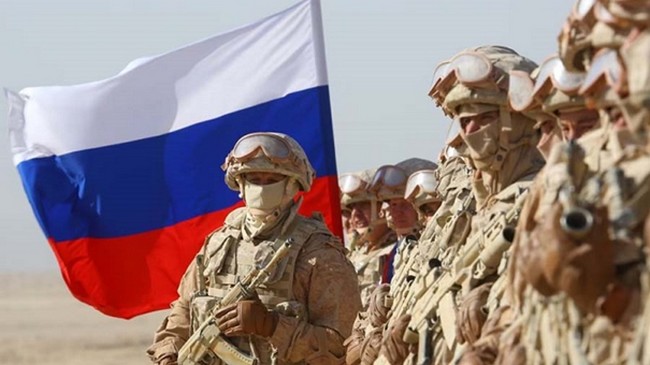
More on this story: Russia’s Africa Corps: Wagner’s Successor in Africa (2022–2025)
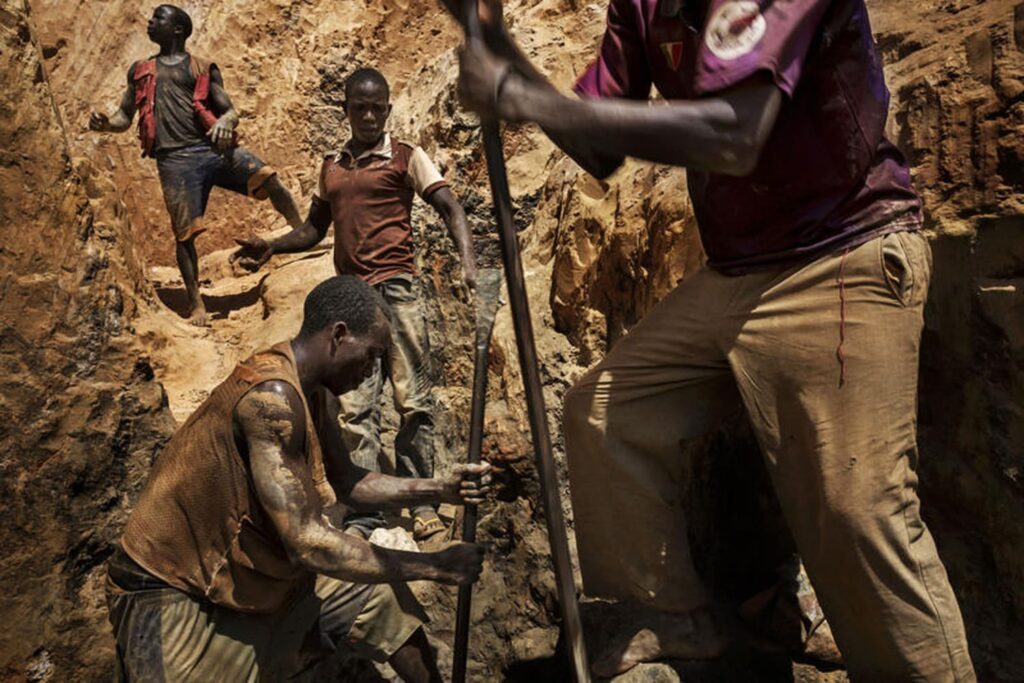
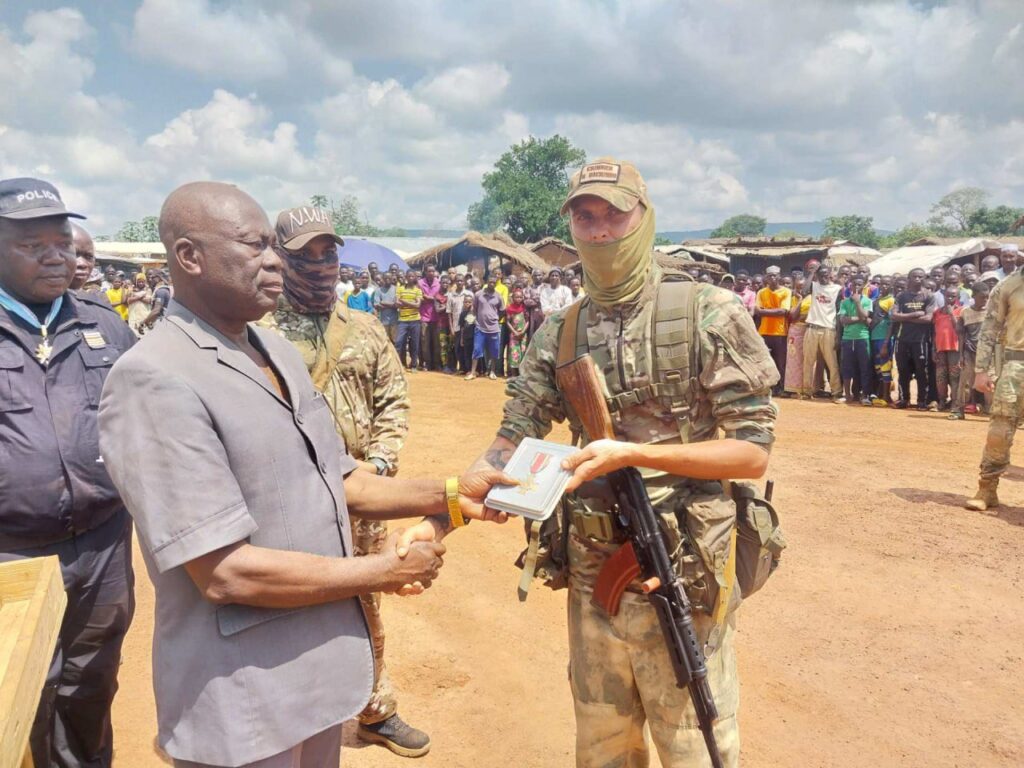
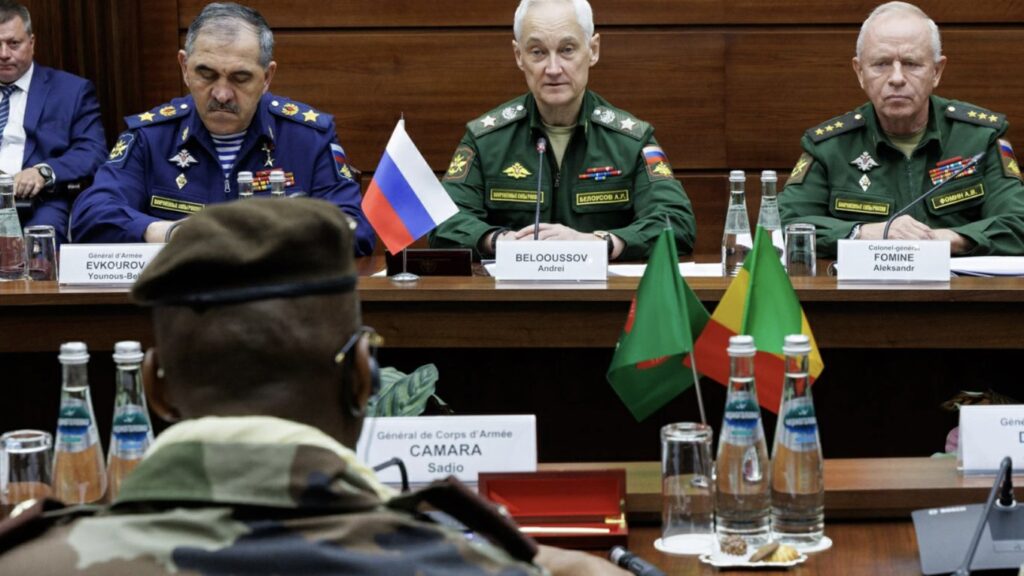
More on this story: How Russia’s MoD Secures and Exploits Sahel’s Strategic Minerals

More on this story: Africa’s New Overseers: Inside Russia’s Covert Gold Empire”
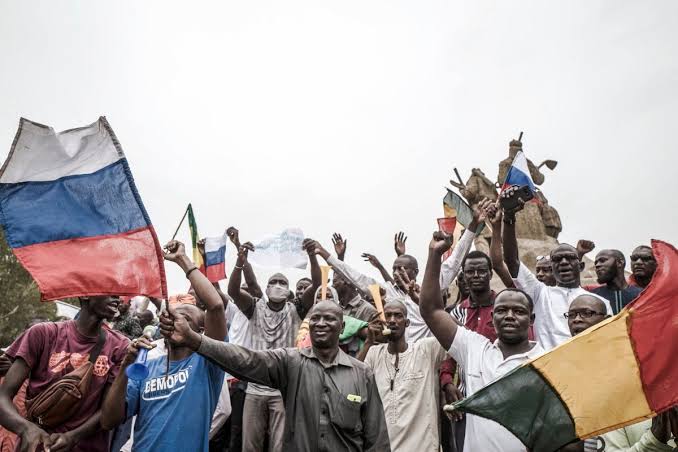
More on this story: Russia’s Influence Operations in Mali: Strategic Assessment
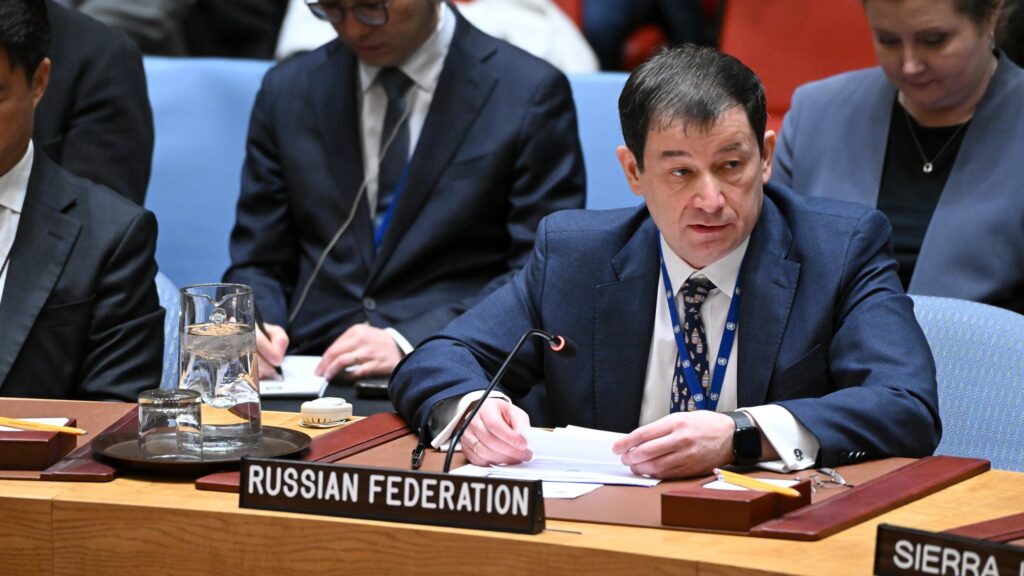
More on this story: Russia’s Role in Prolonging Sudan’s Crisis
